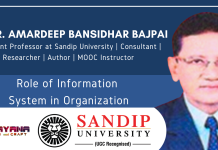
Instructor Profile:
 Dr. Pawan R Bhaladhare
Dr. Pawan R Bhaladhare
Professor, Department of Computer Engineering at Sandip University, Nashik
Dr. Pawan R Bhaladhare is a distinguished academic with over 26 years of experience in the field of Computer Science and Engineering. He holds a B.Tech in Computer Science & Engineering from the prestigious National Institute of Technology, Jalandhar, Punjab, an M.Tech in Computer Science & Engineering from Rajiv Gandhi Technological University, Bhopal, and a Ph.D. in Computer Engineering from Sardar Vallabhbhai National Institute of Technology (SVNIT), Surat, Gujarat.
Dr.Bhaladhare is currently serving as a Professor in the Department of Computer Engineering at Sandip University, Nashik. Throughout his career, he has demonstrated a deep commitment to both teaching and research. His efforts have been recognized with significant research funding, including a grant of Rs. 1,50,000 for his research work and Rs. 50,000 for organizing a state-level workshop, both from the University of Pune.
A prolific researcher, Dr.Bhaladhare has authored and co-authored around 96 papers in various international journals and conferences, with several of his publications indexed in SCI and Scopus. His primary research interests include Information Security & Privacy, Algorithm and Computational Complexity, and Data Mining—fields where he has made notable contributions.
Dr.Bhaladhare’s extensive teaching experience, coupled with his research acumen, makes him a highly respected figure in the academic community, and his work continues to inspire future generations of computer scientists and engineers.
This profile highlights his vast expertise and contributions, providing learners with an opportunity to benefit from his decades of knowledge and experience in MOOCs.
Course Outline: Iterative Design Issues
This course explores the iterative design process, focusing on identifying, analyzing, and addressing design issues that arise during product development. Students will learn how to implement iterative strategies to refine designs, improve user experience, and enhance the overall functionality of products. The course is structured into four comprehensive modules.
Module 1: Introduction to Iterative Design
- Overview and Key Concepts: Definition and principles of iterative design, Understanding the iterative design cycle (Plan, Design, Test, Refine), Comparison of iterative design with traditional design methodologies, Importance of feedback loops and continuous improvement
Module 2: Identifying Design Issues in Iterative Processes
- Detecting Problems Early in the Design Cycle: Common design challenges and issues in the iterative process, Tools and techniques for identifying user needs and pain points, Methods for gathering and analyzing user feedback, Risk management in iterative design (balancing innovation and usability)
Module 3: Solving Iterative Design Problems
- Strategies for Iterative Refinement: Techniques for redesign and improvement based on feedback, Prototyping methods and rapid testing to validate solutions, Balancing creativity with practicality in iterative design, Collaboration in iterative design: Role of cross-functional teams
Module 4: Optimizing the Iterative Design Process
- Refinement and Continuous Improvement: Scaling iterative design processes in larger projects and teams, Using advanced tools (software, simulations) to enhance iterative workflows, Optimizing iteration timelines for efficiency without compromising quality, Best practices for documentation and tracking in iterative design cycles
This course equips students with practical skills to navigate and resolve challenges in the iterative design process, fostering innovation and continuous improvement in design and development projects.






